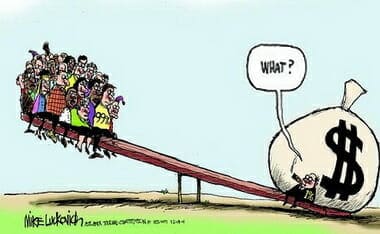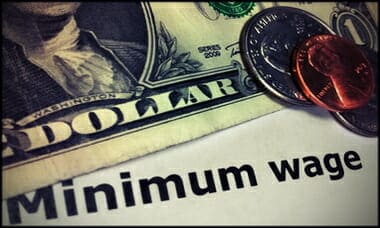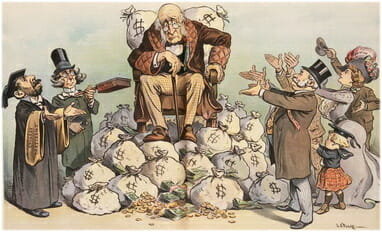(UPDATED w/ Armstrong and Getty [3-24-2021])
Armstrong and Getty read from and discuss a bit an article in the WALL STREET JOURNAL entitled: The myth of American inequality (https://tinyurl.com/ymy5rjz9). Unfortunately the article is behind a pay-wall… but PECKFORD 42 has it for reading.
(UPDATED April 2014 and Today: 12-27-2020)
The below video is a “pop-culture” challenge to an economic principle that if the free-markets are left to choose (free contractual trade for services between people in the supply-and-demand market) would allow the most people to succeed as the innate abilities of people and the market can bare:
Prager University notes that “INEQUALITY IS GOOD”
What if everything you’ve heard about income inequality is wrong? What if it’s actually a good thing for there to be people who are rich and people who aren’t? John Tamny, editor of RealClearMarkets, clarifies one of the big misunderstandings of our time.
If you want a quick dealing with this instead of the more thoughtful look below, here is one excellent quickie:
Politicians and reporters often rail about “the rich getting richer and the poor getting poorer.” In fact, the incomes of poor and middle-income Americans are up 32% since the government began keeping track several decades ago (The Distribution of Household Income [CBO] – PDF). Yes, that increase is adjusted for inflation. Another misleading claim, says Stossel, is the idea that the U.S. “no longer has economic mobility.” But a paper in The Quarterly Journal of Economics found that most people born to the richest fifth of Americans fall out of that bracket within 20 years. (Table 2)) Likewise, most born to the poorest fifth climb to a higher quintile. Some climb all the way to the top.
AEI has a good critique of the video challenge at the top, I will follow this by a video response by Lee Doren:
A video titled “Wealth Inequality in America” has gone viral on the Internet, it’s up to almost four million views on YouTube. It’s not clear who produced it, and it’s not clear what solution is being proposed to the “problem” of wealth inequality identified in the video. What is clear is that it’s another fallacious, static analysis of wealth distribution that focuses only on abstract, statistical brackets at a given point in time, while completely disregarding the most important point: what is happening to actual flesh-and-blood human beings whose income and wealth change all the time and who are moving among the various abstract statistical brackets from year to year.
In the video above titled “What Wasn’t Said in ‘Wealth Inequality In America,’” Steve Horwitz responds to the Wealth Inequality video and reminds us that the most important issue is not what abstract statistical bracket people fall into in a given year, but rather the degree of income or wealth mobility from year to year. It’s an important point, and one that’s completely overlooked in the viral video.
Thomas Sowell has discussed extensively the issues of static versus dynamic analysis of wealth and income distributions, and income and wealth mobility, and here are some of his quotes as an antidote to the limited, static “analysis” of wealth inequality presented in the viral video:
1. Comparing the top income bracket with the bottom income bracket over a period of years tells you nothing about what is happening to the actual flesh-and-blood human beings who are moving between brackets during those years. Following trends among income brackets over the years creates the illusion of following people over time. But the only way to follow people is to follow people. Source
2. Sports statistics are kept in a much more rational way than statistics about political issues. Have you ever seen statistics on what percentage of the home runs over the years have been hit by batters hitting in the .320s versus batters hitting in the .280s or the .340s? Not very likely. Such statistics would make no sense, because different batters are in these brackets from one year to the next. You wouldn’t be comparing people, you would be comparing abstractions and mistaking those abstractions for people.
But, in politics and in commentaries on political issues, people talk incessantly about how “the top one percent” of income earners are getting more money or how the “bottom 20 percent” are falling behind. Yet the turnover in income brackets over a decade is at least as great as the turnover in batting average brackets. Source
3. Only by focusing on the income brackets, instead of the actual people moving between those brackets, have the intelligentsia been able to verbally create a “problem” for which a “solution” is necessary. They have created a powerful vision of “classes” with “disparities” and “inequities” in income, caused by “barriers” created by “society.” But the routine rise of millions of people out of the lowest quintile over time makes a mockery of the “barriers” assumed by many, if not most, of the intelligentsia.” Source
4. Most people are not even surprised any more when they hear about someone who came here from Korea or Vietnam with very little money, and very little knowledge of English, who nevertheless persevered and rose in American society. Nor are we surprised when their children excel in school and go on to professional careers. Yet, in utter disregard of such plain facts, so-called “social scientists” do studies which conclude that America is no longer a land of opportunity, and that upward mobility is a “myth.” Source
5. Most working Americans who were initially in the bottom 20 percent of income-earners, rise out of that bottom 20 percent. More of them end up in the top 20 percent than remain in the bottom 20 percent. People who were initially in the bottom 20 percent in income have had the highest rate of increase in their incomes, while those who were initially in the top 20 percent have had the lowest. This is the direct opposite of the pattern found when following income brackets over time, rather than following individual people. Source
6. Most of the media publicize what is happening to the statistical brackets — especially that “top one percent” — rather than what is happening to individual people. Source
Here is Lee’s response (Preserved by me!)
Lee Doren has a passion for public speaking, being the youngest speaker to lecture for the Ronald Reagan Political Lecture Series at Oberlin College. He has given speeches in Annapolis, Maryland on the Bill of Rights and at the U.S. Capitol for the 9/12 March on Washington. He has been invited to lecture at The Cato Institute, The Institute for Energy Research, the Young Britons’ Foundation in the United Kingdom, the State Policy Network and Lehigh University. He has also provided commentary for Fox News, CNN, Reuters, PBS and Air America.
I would recommend the following articles for further reading:
- YouTube Wealth Inequality Video Fails to Tell the Whole Story (Policy Mic);
- Why Inequality Doesn’T Matter: At Least Not Income Inequality (The Federalist);
- Inequality Fallacies: The Left Gets The Facts Wrong On Economic And Racial Disparities (National Review Online);
- Income Inequality Deception (Forbes);
- Dispelling Myths About Income Inequality (Forbes);
- The Five Biggest Myths About Income Inequality (Forbes);
- The Income-Inequality Myth: Reports Of Skyrocketing Incomes For The Wealthy And Stagnating Wages For The Rest Are Unfounded (National Review Online);
- The American Dream of Income Equality Still Lives (Scientific American);
- Debunking The Top Three Myths About Income Inequality (CNBC);
- Inequality Myths (CATO).
- Five Myths About Economic Inequality In America (CATO)
(This portion can also be found in the “Rich Get Richer/Poor Get Poorer” Mantra.) Larry Elder notes when this “widening” happened the most:
Here are some myth busting to help the layman researcher get more facts to respond to the pop-politics we run-across in our social media lifestyle. Investors Business Daily makes some key points that are hard to ignore:
Income Inequality Rose Most Under President Clinton
…But it turns out that the rich actually got poorer under President Bush, and the income gap has been climbing under Obama.
What’s more, the biggest increase in income inequality over the past three decades took place when Democrat Bill Clinton was in the White House.
The wealthiest 5% of U.S. households saw incomes fall 7% after inflation in Bush’s eight years in office, according to an IBD analysis of Census Bureau data. A widely used household income inequality measure, the Gini index, was essentially flat over that span. Another inequality gauge, the Theil index, showed a decline.
In contrast, the Gini index rose — slightly — in Obama’s first two years. Another Census measure of inequality shows it’s climbed 5.7% since he took office.
Meanwhile, during Clinton’s eight years, the wealthiest 5% of American households saw their incomes jump 45% vs. 26% under Reagan. The Gini index shot up 6.7% under Clinton, more than any other president since 1980…
[….]
As University of Michigan economist Mark Perry notes, while the income gap has grown since 1979, almost the entire increase occurred before the mid-1990s: “There is absolutely no statistical support for the commonly held view that income inequality has been rising recently.”
A similar analysis found that income inequality has fallen among individuals since the early 1990s, but risen among households due to factors such as more marriages of people with similar education levels and earnings potential.
Others argue that income mobility matters more than equality.
One study found that more than half of the families who started in the lowest income bracket in 1996 had moved to a higher one by 2005. At the other end of the spectrum, more than 57% of families fell out of the top 1%.
Another smaller post points out nearly the same:
…The left says current levels of income inequality echo the late 1920s and the Gilded Age. They’ve zeroed in on the richest 1%, citing Census Bureau data showing these top earners “grabbing” more income than the bottom 90%.
But the census stats are misleading.
For one, they are a snapshot of income distribution at a single point in time. Yet income is not static. It changes over time. Low-paying jobs from early adulthood give way to better-paying jobs later in life.
And income groups in America are not fixed. There’s no caste system here, really no such thing even as a middle “class.” The poor aren’t stuck in poverty. And the rich don’t enjoy lifetime membership in an exclusive club.
A 2007 Treasury Department study bears this out. Nearly 58% of U.S. households in the lowest-income quintile in 1996 moved to a higher level by 2005. The reverse also held true. Of those households that were in the top 1% in income in 1996, more than 57% dropped to a lower-income group by 2005.
Every day in America, the poor join the ranks of the rich, and the rich fall out of comfort.
So even if income equality is increasing, it does not mean income mobility is decreasing. There is still a great deal of movement in and out of the richest and poorest groups in America.


























